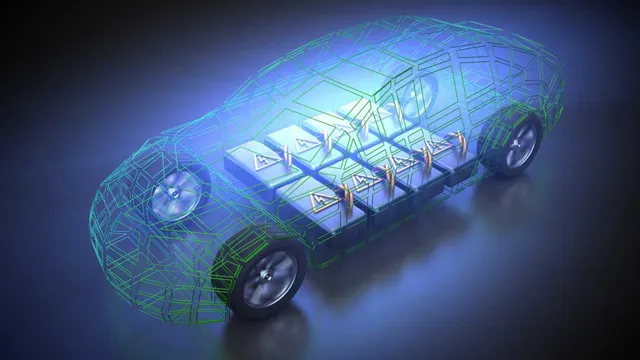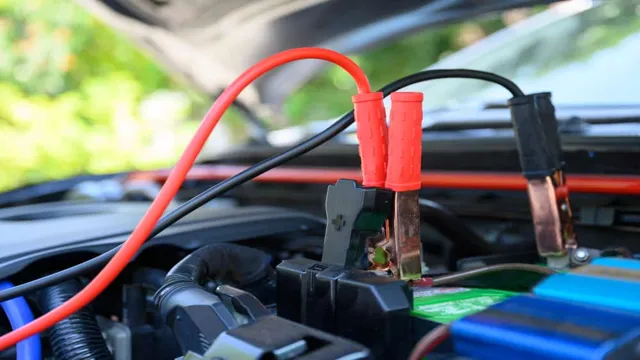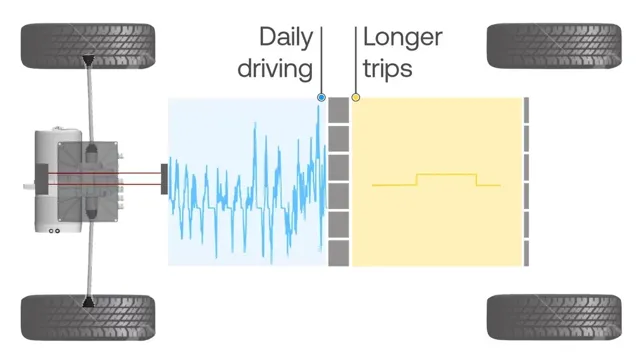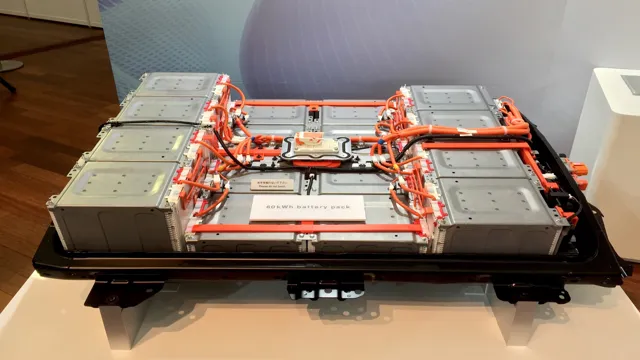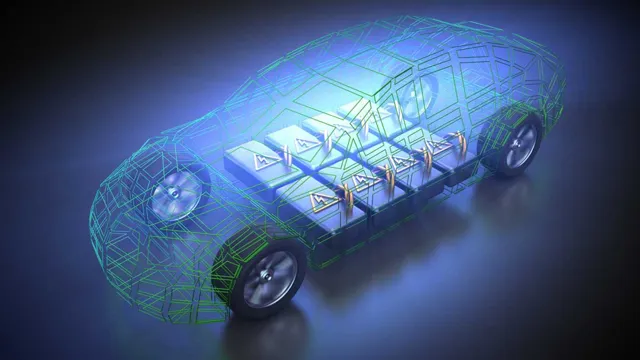The Shocking Truth About the Cost of a New Electric Car Battery: Is it Worth it?
Electric cars are deemed as the future of the automobile industry, with manufacturers such as Tesla, Nissan, and BMW leading the way in their quest to build greener and more sustainable vehicles. However, a major question mark that often deters potential electric car buyers is the cost of electric car batteries. While many are aware that electric cars are more expensive than conventional gas vehicles, the specifics on the cost of the battery system can be unclear.
In this blog, we will dive into the nitty-gritty details and analyze the cost of electric car batteries. We’ll explore the factors that affect the cost of production, and what the future holds for electric car battery prices. So buckle up, and let’s start our journey into the world of electric car batteries!
Introduction
The cost of a new electric car battery is a major concern for both current and potential electric car owners. While electric cars are a great alternative to traditional gasoline-powered cars, their batteries come with a higher price tag. The cost of a new electric car battery varies, depending on the make and model of the car, but on average, it can cost anywhere from $5,000 to $15,000 or even more.
That being said, the cost of an electric car battery is expected to come down in the near future due to advancements in technology and increased production volume, making electric cars more accessible to the masses. As the demand for electric cars grows, so does the competition, which will drive down prices and make them a more viable option for everyday consumers. So while the cost of a new electric car battery is still relatively high, it’s important to remember that this technology is still in its early stages and is constantly improving.
Growing Demand for Electric Cars
The demand for electric cars is on the rise as people are becoming more environmentally conscious and are looking for alternative transportation options. With concerns over climate change and air pollution, many consumers are turning to electric cars as a viable solution. In addition to the environmental benefits, electric cars also offer cost savings in terms of fuel and maintenance.
Government incentives, such as tax credits, are also encouraging the adoption of electric cars. As technology continues to improve, electric cars are becoming more affordable and practical for everyday use. It’s clear that electric cars are the future of transportation and the demand for them is only going to increase.
Importance of Battery Replacement
Battery replacement is often overlooked, but it is essential for ensuring that our devices and vehicles function properly. Whether it’s a cell phone, laptop, or car, batteries have a limited lifespan and will eventually require replacement. Neglecting to do so can lead to a host of issues, from decreased performance to complete failure.
Not only does replacing a battery improve performance and functionality, but it can also save you from the frustration and inconvenience of a device suddenly dying. So, the next time you notice your device or vehicle struggling to hold a charge or experiencing other battery-related issues, don’t hesitate to replace the battery. It’s a simple but crucial step that can make a big difference in the long run.
Factors Affecting Battery Cost
The cost of new electric car batteries can vary depending on several factors. One significant factor is the battery’s size and the amount of energy it can store. The larger the battery, the more expensive it tends to be.
Another factor that affects the cost is the type of battery technology used. Lithium-ion batteries are commonly used in electric cars because of their energy density and long lifespan, but they can be pricey to produce. Additionally, the supply and demand for electric vehicles and batteries can impact costs.
Limited availability of electric cars in the market and high demand can cause prices to go up. However, as more car manufacturers produce electric vehicles, the cost of batteries is likely to decrease. Finally, advancements in battery technology, such as improved chemistry and production methods, can bring down costs and make electric vehicles more accessible to consumers.
Despite these factors, the overall cost of new electric car batteries is expected to decrease in the near future, making electric cars more affordable and accessible to a broader range of consumers.
Battery Capacity
When it comes to battery capacity, one important consideration is the cost. There are several factors that can affect the cost of a battery, including the materials used, the manufacturing process, and the size of the battery itself. For example, batteries made with more expensive materials like lithium-ion tend to be more costly, while cheaper materials like lead-acid are more affordable.
Additionally, the manufacturing process can impact the cost, with more complicated processes requiring greater investment. And of course, larger batteries will typically be more expensive due to the increased amount of materials required. It’s important to consider all of these factors when selecting a battery, as you’ll want to find a balance between cost and capacity that fits your needs.
Vehicle Model
Vehicle Model When it comes to selecting a vehicle model to purchase, the various factors to consider can seem overwhelming. One crucial consideration is the cost of the car’s battery, especially for electric vehicles. The battery cost varies depending on several factors, including the battery size, type, and the vehicle’s overall range.
Higher-capacity batteries, such as those found in luxury electric vehicles like Teslas, cost more than lower-capacity batteries found in compact electric vehicles. Additionally, the lithium-ion batteries commonly used in electric vehicles are pricier than traditional lead-acid or nickel-metal hydride batteries. Finally, factors like the vehicle’s weight and aerodynamics can significantly impact its overall range, ultimately affecting the battery’s overall cost.
With the rise of electric vehicles in today’s market, understanding the various factors that impact battery cost is essential for anyone interested in purchasing an electric vehicle.
Battery Type
When it comes to battery cost, there are several factors that can affect the price tag. One major factor is the type of battery. There are several types of batteries available in the market, each with its own advantages and disadvantages.
For example, lead-acid batteries are the most commonly used batteries for cars and other vehicles. They are relatively inexpensive, but they have a shorter lifespan compared to other types of batteries. Lithium-ion batteries, on the other hand, are more expensive, but they last longer, are lighter, and can store more energy.
Another factor that can affect battery cost is the manufacturer. Some manufacturers are known for producing high-quality batteries, which can be more expensive than those made by less reputable companies. Additionally, the size and capacity of the battery can also impact the cost.
Generally speaking, the larger the battery and the greater its capacity, the higher the price. This is because larger batteries require more materials and resources to produce. Finally, the intended use and application of the battery can also play a role in determining its price.
For example, batteries used for high-performance applications such as electric vehicles or off-grid solar systems may be more expensive due to the demands placed on them. In summary, there are several factors that can affect battery cost, including the type of battery, the manufacturer, the size and capacity, and the intended use. It’s important to consider these factors when choosing a battery to ensure that you get the best value for your money.
While a cheaper battery may seem like a good deal in the short term, investing in a higher-quality battery is likely to be more cost-effective in the long run due to its longer lifespan and better performance.
Average Electric Car Battery Cost
The cost of a new electric car battery can vary widely depending on the make and model of your vehicle. Generally speaking, a replacement battery for an electric car can cost anywhere from $5,500 to $15,000. The biggest factor in determining the cost of a new battery is the size of the battery and the amount of energy it can store.
The larger the battery, the more expensive it will be. Other factors that can affect the cost include the age of the vehicle, the manufacturer of the battery, and whether you choose to purchase an OEM (Original Equipment Manufacturer) battery or an aftermarket battery. It’s important to note that, while a replacement battery can be expensive, electric vehicles still tend to have lower overall maintenance costs than gas-powered vehicles.
Plus, many manufacturers offer warranties on their batteries, so it’s always worth checking with your dealer to see what kind of coverage you can expect. All in all, while the cost of a new electric car battery may seem daunting, the savings you’ll reap from driving an electric car will likely offset this expense in the long run.
Latest Industry Trends
Electric Car Battery Cost Have you been thinking of purchasing an electric car? One of the first things to consider is the average cost of the battery. Generally, the battery accounts for a significant proportion of the car’s total cost, which can be a deterrent for some consumers. However, with evolving technology, the cost of electric car batteries has been gradually decreasing, making electric cars more accessible to the masses.
In 2010, the average cost of an electric vehicle battery was around $1,100 per kWh, while today it has dropped to $137 per kWh, which is a significant reduction. This trend is expected to continue as the demand for electric vehicles increases, and more companies invest in the research and development of EV batteries. It is important to note that battery costs vary depending on the car model and manufacturer, so it is essential to research and compare prices before making a purchase decision.
In conclusion, while the initial cost of an electric car battery may be daunting, it is decreasing, and the long-term benefits of owning an electric car, like saving on fuel, make it a worthwhile investment.
Estimates from Top Manufacturers
When it comes to the average cost of an electric car battery, estimates vary based on a number of factors. According to top manufacturers, the cost of a battery pack for an electric car ranges from $125 to $225 per kilowatt-hour (kWh). This means that a typical electric vehicle with a battery size of around 60 kWh could cost anywhere from $7,500 to $13,500 just for the battery pack.
Of course, other factors such as production volume, battery chemistry, and manufacturing technology can also impact the final cost. Despite these variations, industry experts agree that the cost of EV batteries has been steadily decreasing in recent years, making electric cars more accessible and affordable for consumers. As new technologies emerge and production processes become more efficient, we can expect to see even lower costs in the future.
Factors to Consider When Choosing a Battery
Cost is definitely a factor to consider when looking for a new electric car battery, but it’s not the only one. You also want to consider factors such as the range of the battery, the charging time, and the warranty. A longer range battery will give you more flexibility and peace of mind when it comes to driving longer distances.
Similarly, a faster charging time can save you time and hassle when you’re on the go. Finally, a good warranty can protect your investment and ensure that you get the performance you expect from your battery over the long term. So while cost is certainly important, it’s important to consider the bigger picture when choosing a battery for your electric car.
Warranty and Lifespan
When it comes to choosing a battery, there are a few factors to consider that can affect its lifespan and warranty. One important factor is the type of battery chemistry used, as each type has its own optimal conditions for performance and longevity. Other factors to consider are the temperature range the battery will operate in, the amount and frequency of use, and the charging and discharging cycles.
Additionally, it’s essential to choose a reputable brand with a good warranty policy and customer service to ensure that any issues or defects are promptly resolved. By taking these factors into account, you can find a battery that will provide reliable and long-lasting performance for your needs.
Charging Time
When it comes to choosing a battery, one of the essential factors to consider is the charging time. The time your battery takes to charge can significantly impact your daily life, especially if you rely on your device for work or entertainment. There are several factors to consider when assessing charging times.
First, the battery’s capacity affects the time it takes to charge fully. The higher the capacity, the longer it will take to charge. Temperature is another critical factor to consider.
If the battery is hot, it will take longer to charge, while cooler temperatures can speed up the charging process. Lastly, the type of charger you use can affect the charging time. Using a high-quality, quick-charging charger with your battery is crucial to ensuring fast charging times.
When considering a new battery, research its charging time and always invest in a charger that is compatible with your battery to ensure you’re getting the quickest charge possible.
Range and Performance
When choosing a battery for your device, there are several factors to consider, including its range and performance. The range refers to how far your device can go on a single charge, while performance indicates how well the battery can power your device’s functions. One crucial aspect to keep in mind is the battery’s capacity.
The larger the capacity, the longer the range, and the better the performance. However, higher capacity batteries also tend to be more expensive and heavier. Another factor to consider is the battery’s chemistry.
Lithium-ion batteries are the most common as they offer a high energy density, long lifespan, and are relatively low maintenance. Finally, it’s crucial to ensure that your battery’s voltage and current rating match your device’s requirements. Selecting the right battery that can deliver optimal range and performance for your device will ensure that it functions well and efficiently for longer periods.
Conclusion
In conclusion, the cost of a new electric car battery may shock you, but it’s important to remember that this investment will not only save you money in maintenance and fuel costs over time, but it’s also a necessary step in reducing our carbon footprint and creating a more sustainable future. So, while the initial cost may be a bitter pill to swallow, the long-term benefits are truly electric!”
Affordability and Sustainability of Electric Cars
When it comes to choosing a battery for your electric car, there are a few factors to consider that can impact both affordability and sustainability. One important factor is the battery’s capacity, which determines how far your car can go on a single charge. This is generally measured in kilowatt-hours (kWh), and higher capacity batteries tend to cost more upfront but may save money in the long run by reducing the need for frequent charging.
Another important consideration is the battery chemistry, which can impact both performance and environmental impact. Lithium-ion batteries are currently the most popular choice for electric cars, but there are also newer technologies like solid-state batteries that may offer improved performance and sustainability. Finally, it’s important to consider the battery’s life cycle and disposal, as sustainable materials and recycling options can reduce environmental impact and potentially lower costs over time.
Overall, choosing a battery for your electric car involves weighing a variety of factors to find the best balance of affordability, sustainability, and performance for your needs.
Future Prospects of Electric Car Batteries
When it comes to choosing an electric car battery, there are several factors to consider. First off, the range of the battery is essential, as this determines how far you can drive your electric car before needing to recharge. Additionally, the battery’s capacity, measured in kilowatt-hours (kWh), impacts how much energy it can store and how long it takes to charge.
The type of battery chemistry is also crucial as each has its own strengths and weaknesses. For instance, lithium-ion batteries are popular due to their high energy density, but they are also more expensive than other battery types. Moreover, the battery’s durability and lifespan must also be taken into account as they impact the battery’s overall cost and its environmental impact.
In conclusion, when selecting an electric car battery, it’s essential to consider these factors to ensure you find the best battery for your needs and budget.
FAQs
What is the average cost of a new electric car battery?
The average cost of a new electric car battery ranges from $5,000 to $7,000, depending on the make and model of the car.
How long does a typical electric car battery last?
The lifespan of an electric car battery can vary depending on the climate, driving conditions, and maintenance. However, most electric car batteries last between 8 and 10 years.
Can an electric car battery be recharged at home?
Yes, most electric car owners can recharge their batteries at home using a standard household outlet. However, it may take longer than using a dedicated charging station.
Are there any government incentives for purchasing an electric car battery?
Yes, there are federal and state incentives available for purchasing an electric car battery. These can range from tax credits to rebates, depending on your location and income level.
